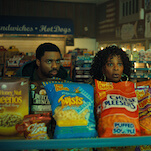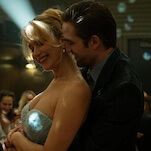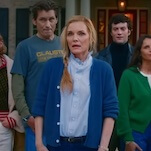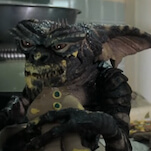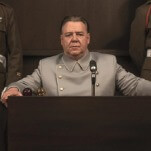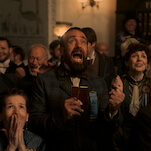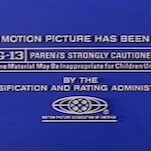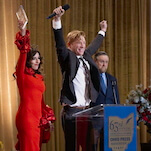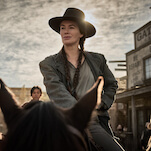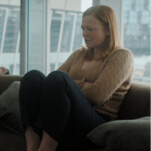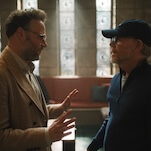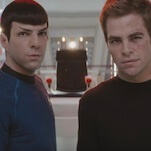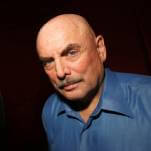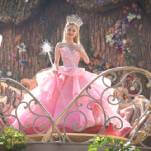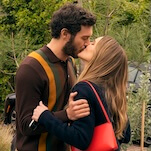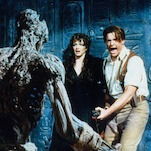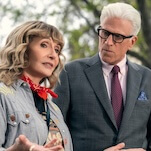“Live From Studio 6H” (S6/E19, April 26, 2012)
TGS is ceasing live episodes, and Liz is trying to convince Jack to let them continue to do the show live. The gang recalls the greatest moments in live-television history.
RC: You mentioned [in Part 2] the Upright Citizens Brigade live show that that we did during the strike. Tina and I had always talked about [doing one], just given the stable of actors that we had—and writers to a certain extent—and their skills as live performers. Jane [Krakowski]’s won Tony awards, Judah [Friedlander] is a standup—the improvisers, [Jack] McBrayer and [John] Lutz and [Scott] Adsit.
AVC: We haven’t talked about Kenneth yet.
RC: We haven’t. Kenneth is the glue. And then Tracy [Morgan], of course, SNL, Alec has hosted SNL more than anyone else. So it was always out there among the conversations we would have. And then we did that live show, felt that live audience feedback, and we felt like we have to crack this. And I think—and I’ll try to talk about both live shows, if that’s okay—what I think is interesting is, we always knew the way we shoot and edit and do our show, our usual single-camera show, we take advantage of everything we can, of every device. Whether it’s mimicking shots from a movie we’re quoting, or whether it’s the kind of performance things that we ask of Alec and Tina and everybody. And you’re just so greatly limited when you go to do that in multi-camera. You just have so many fewer tools at your disposal. And being live is just exponentially more difficult. I was just talking to Mike Schur about the last live episode recently, and he was just saying how our shows—he’s talking about Parks And Recreation and us—are found in the edit room. And I think that’s very true. We get a lot of different versions of performances, and we’re trying to tell complicated stories and discover what is the stuff that’s not necessary, and it’s very hard to realize that stuff beforehand.
What we tried to do with that first one was, nonetheless, do our show. We were aware of the limitations, but we were trying tell stories that were close to 30 Rock stories. At the end of the day, it was a directing feat. Beth McCarthy-Miller, who used to do Saturday Night Live, was nominated for an Emmy for [“Live Show”], but should have won hands-down. What she did directing for that was just an athletic feat, basically. What the actors did, what we were able to accomplish and cram in there, the degree to which we were able to do a 30 Rock episode, I am proud of, but I don’t think it quite comes off. All the bells and whistles, the fun of it, the “live” of it is the fun of it, the guest stars and the fake commercials and that stuff. So we would never hold that up in any way as an ideal of what the show is. So this year, when NBC really wanted another live show, what we really felt we needed to do was have a reason to do an episode that was the bells and whistles. And I think it was Tina that pitched the idea of flashbacks about the history of that studio, and to just use our sketch players. The reason to do it is because these guys are great performers, let’s let them perform live. And I ended up being much more satisfied with the one we did this year. It felt like what we should be doing for a live show, rather that trying to shove a 30 Rock into a live show.
AVC: Is it hard to get guests for those live episodes, or are the guest stars eager to jump on board?
RC: It hasn’t been that hard. It’s always about, “Are you in New York this day?” And I think [Jon] Hamm was there for a couple of days to rehearse, but Donald Glover, because he’s touring with his musical career, he just came in on Thursday. But in terms of asking people to do it, they’re pretty open to it. This year, we kind of stuck to friends and family, because we knew we had that one big—there was the joke built around having some big guest cast, the Paul McCartney joke. Fortunately, Sir Paul was good enough to do that. [Laughs.] In between his flight from Brazil, he landed in New York, did that, and then flew on to London to take his daughter to school. So we benefit from the kindness of strangers more than a lot of shows, but those are fun to do.
AVC: Whose idea was it to get Kim Kardashian?
RC: We had to do a West Coast feed and we needed someone else for that [celebrity slot], because Mr. McCartney had to move on. We thought, “Who’s the most West Coast person we can get?” And she was the first name that came to mind.
AVC: It’s the same experience as seeing Jeff Dunham on the show. Worlds are colliding at this point.
RC: It is funny. The strange bedfellows that 30 Rock makes, it’s pretty fun.
“Queen Of Jordan” (S5/E17, March 17, 2011)
Angie Jordan stars in a fake reality show about her new single, “My Single Is Dropping,” dropping. Liz and Jack try to enlist Angie’s help getting Tracy back from Africa.
RC: Oh, that’s a fun one to talk about. “Queen Of Jordan,” to me, touches on a bunch of things. One of which is that shooting that style, that fake doc style, is a lot cheaper. We’re an expensive show, and NBC is very understanding of that, but that doesn’t mean Tina and I don’t have phone calls we don’t want to have, about how we need to save money. And the main reason we did it again [this season]—one of the reasons—was because it was cheap and we were in the hole. Another thing it touches on is, that style is just easier to write. We were able to tell five stories. We usually don’t have time—I mean, we did a four-story finale this year, and we cut six and a half minutes out of the director’s cut to get it down, just because telling more stories takes more time. Even though the page count is not that different, just the ins and outs, there’s less you can cut. And having that device of talking to camera sort of flies in the face of a basic tenant of show, don’t tell. But it lets you tell. Whenever you run into a moment that would take constructing a scene and having reasons to demonstrate dramatically or through performance, through actual event, what’s happening and what people are thinking, that’s a lot harder than just smash-cutting to the confessional. So we like that change of pace for writing a lot, was another reason to go after it again. And that was something we discovered from doing it that first year.
But when we did it the first time, it was part of another thing that I think is worth talking about. Season five was kind of a tough season. I think I would have rather been spending the work we did in season four, which was sort of the emotional buttressing, building up and creating more dynamics and stuff. And season five ended up being us doing things that given the choice, we wouldn’t have been doing creatively. We ran into some outside circumstances, one of which was Tracy’s unfortunate illness. I mean, he had to get a new kidney. He very suddenly became unavailable to us for five or six episodes, and he was a big part of the show. Even though sometimes, as I said before, he’s fifth business, coming in and just saying jokes. The tone that he gives, the kinds of jokes that he gives us and the kinds of stories—and we’re talking about over the course of five or six episodes—are a big part of the tone of the show.
[pagebreak]
So we were being forced to do a quarter of the year without Tracy. And thank God he’s well. That’s much more important, obviously, but if we’re looking through the comedy microscope, it was a new position to be in creatively, where we weren’t exactly doing the stories we would have chosen to do. Now, that said, I think “Queen Of Jordan” was my favorite way of trying to solve that problem. It was very much about the fact that he was gone. I didn’t love him being gone by any means, but we did something very different, and at least partly owned it. And Sherri [Shepherd] was great at it. In a world where we felt a little dislodged, it felt like we were creatively—as wide as our comfort zone is—not in our comfort zone, doing that very different kind of show and letting it be about the stuff that was shaking us off track. It was very helpful, very cathartic. And in that kind of format, with that kind of shooting and that kind of writing, you can pack so much stuff into it. That was just a fun episode to write. And beyond that, it let us do certain meta things about reality television, and to that end it felt like a 30 Rock.
AVC: With Tracy being gone, it seemed like there was a lot of Kenneth development happening, since he was essentially his surrogate.
RC: Definitely. As we said before, when we started to do stories with Kenneth and Jack, we were unsure of whether that would work. Jack is such a strong character, and Ken is intentionally sort of this whatever-everyone-wants character. But what we found was this really fun thing back in the day that, ultimately, Kenneth’s moral superiority drives Jack crazy. And it’s a fun kind of conflict that Kenneth doesn’t need to create, because he’s not trying to create conflict. But I always say that from the beginning of the show, Kenneth is one of the most important characters. When we were trying to make all of this gel together, to earn and allow for these more crazy moments, more stretched moments of reality or magic realism or whatever, Kenneth was the lubricant that allowed that machine to work. If you just have Tracy running around in a world full of smart, self-aware people, he’d just be a crazy person. But Kenneth’s goal in life is to make Tracy happy. There’s nothing greater to him, no higher calling to him. And I think “Jack The Writer” is the episode where Kenneth is just getting sent on errands by Tracy. It’s not much of a story, and it doesn’t dovetail on anything, but you couldn’t tell that story without Kenneth. You need Kenneth to allow Tracy to act like that; you need Kenneth to allow Jenna to act like that. So I’ve always thought that Kenneth was a crucial character in the early days of the show, because he would abet, in a human way, the sort of behavior that other people wouldn’t tolerate. That sometimes Liz Lemon was trying to stop. But Kenneth saw his duty as higher than hers in many ways. And then you’re right, in those later seasons, Tracy’s absence did allow him to do more things, because there would be a hole there.
AVC: And now this season, he’s frantically trying to get back in with Tracy.
RC: [Laughs.] Yeah, it’s sad.
“Hey Baby, What’s Wrong?” (S6/E6, Feb. 9, 2012)
Liz and Criss visit IKEA and try not to let the experience ruin their relationship. Jack flirts with Avery’s mom, and the writers try to get Lutz laid.
AVC: This episode marks the introduction of Hazel the page, played by Kristen Schaal, who’s so good, it feels like she’s been a part of the show the whole time.
RC: She’s awesome, yeah. And it feels like she’s sticking, in a good way. We brought in Danny [Cheyenne Jackson], and we didn’t serve him in quite the right way, whereas Hazel creates problems, in a good way, for our characters and she’s going to continue to through the end of the season. I think what you’re observing is very much correct, that [this episode] was very much dependent on the ensemble. That’s in part because we sat down to do an hour—because we started late, NBC wanted some hour episodes, and we hadn’t really done hours before. And in thinking about that the questions are, “Do some stories end at the midpoint? Do some continue?” And for the most point, I think we erred on the side of the stories would go through both half-hours. And we’d tell more stories over the course of the hour. But that meant we needed more help from all of our characters to do it. I always like episodes that feel connected thematically, and obviously the cheap and easy way to do that is to do it through the lens of a holiday like Valentine’s Day. But what was nice was because Jack was off with guest cast, and so was Liz, we still were using everybody. Sometimes when you have an episode where Jack and Liz are not focused in on our characters, it can feel a little disconnected and there isn’t enough room to use everybody. But because it was an hour, we were able to engineer things that used all of our tools.
AVC: Did Elizabeth Banks’ lack of availability drive the Jack-Diana story?
RC: During season five, my creative feeling of dislocation was that we finally got burned by our insistence on bringing in the splashiest people to play love interests. Which is something that’s driven by a number of factors, not the least of which is when you’re casting someone opposite Alec Baldwin, they just have to have presence. And Liz was perfect for that role, but she’s a busy lady. We went down that road with our eyes open in terms of her marrying him and everything, but our mutual hope that it would work out perfectly didn’t happen. We were telling some stories that we had intended to tell with her there, then she couldn’t make it. And that was frustrating, combining with the Tracy situation. There was a period there in season five that, now that we have a very healthy Tracy and everything else, we’ve pulled out of nicely. So just out of practical necessity, we sent Avery away, and she does come back at the end of this year. Now that she’s done promoting The Hunger Games. It’s our own fault at a certain point. But we wanted to continue to allow Jack to have those kinds of stories. She wasn’t going to be around, and in our perverse sense of, “How do you do that without letting him…?” Because none of us wanted him to cheat on his wife or anything, so what’s the way to get all that tension and have it as weird and fraught as possible? So obviously, the terrible inappropriateness of him hanging out with her mother is where we ended up.
AVC: Is there something in particular about IKEA that you decided to write toward? Do you personally have any terrible IKEA memories?
RC: [Laughs.] No, not particularly. And it’s funny, they wrote us a very nice, very funny letter after we did that. We couldn’t ask for their permission, because if they had said no, there would have been all kinds of legal implications. So you never see an IKEA logo in there. We mimic the colors and we mimic their types.
AVC: You can say the name of the store, though, without asking permission?
RC: Yeah. As long as our sales department is okay with it. So I was kind of surprised, from a legal point of view, we were able to do that episode that baldly. But they had a wonderful sense of humor about it, and sent us a bunch of stuff, sent us a letter saying it’s not their fault if Liz and Criss ever break up. So more power to ’em. I’m not sure where that came from, how IKEA got distilled down to the alpha and omega of couples discord, but I don’t think you can argue with the fact that it’s a difficult experience. [Laughs.]
“Leap Day” (S6/E9, Feb. 23, 2012)
Jack struggles to spend more time at home, and is visited by the ghosts of Leap Days’ past, present, and future, who show him visions of what his daughter’s life would be like without him around. Tracy has to spend $50,000 at Benihana in one day. Liz is hit on by a billionaire from her past, and Jenna encourages her to go with it.
RC: This occupies the same air as the Paul Reubens episode [“Black Tie”], where we’re really insisting that the audience go along with our version of the universe. And this is a very extreme example of that, where we’re creating a holiday, and creating a world where that holiday is celebrated. It made for a real writing challenge, where there’s so much exposition. We made an adjustment [in the script] of allowing Liz come from the regional idea that they don’t really celebrate it where she’s from, so she could at least be the eyes and ears and voice of the audience. But in terms of breaking that episode, it has to be the right kind of idea for us to have the confidence to subject the audience to that much—we respect our audience a great deal, and hope that they feel rewarded in having to follow along with what’s happening.
AVC: Trust a show that delivers a man in an old-timey barbershop outfit with gills on his neck.
RC: Oh my God. The level of detail that we could have put into those 22 minutes. It just opened up a whole new world to us. I mentioned Springfield [from The Simpsons] before. Springfield is sort of a microcosm of our world, and breaking “Leap Day” was very satisfying. Because it opened up our universe that much more, and we got to create our own rules entirely. And adding in the Jim Carrey movie, and all those layers. Trying to pitch that, to describe that to Jim—because we wrote him a note when we went out to him. I was writing this email to him or to his manager that would be passed on to him, trying to explain what this is. It’s the movie within the TV show for the fake holiday—and he totally got it, he was fantastic. That guy only does 150 percent.
AVC: Are there things in the show’s history where you think, “I can’t believe we got away with this”?
RC: Whether we sold people on “Leap Day,” we’ll see in four years if people are celebrating Leap Day in the right way, with rhubarb and candy. But I just remember sitting there breaking that episode, and it was with some new writers. We didn’t get a Christmas episode this year, but we did have a Leap Day. And the idea of, “Can we pretend it’s a real holiday?” was already out there when I came into the room. There were several new writers in the room, because we did a fair amount of staffing last year, and I think even as viewers, as fans of the show they weren’t sure this was a place worth exploring. Is this worth our time? And in the back of my mind, I’m thinking, “Okay, I need to take this to Tina and make her think it’s worth her time, and the show’s time, and the 22 minutes we’re allotted.” And jumping into that, and seeing those new writers get excited about, “Oh, we’re really going to try to explore this. We’re really going to see if we can tell four stories that are about Leap Day”—and discovering halfway through that, “Okay, what if Jack’s is sort of a Scrooge, Tracy’s is sort of like the spirit of Leap Day, and treat it like Christmas, but it’s all twisted and we all have to make sure we’re keeping track of what it is?”
I remember being very aware—especially watching the newer writers get excited about this idiotic idea and wonder, “Can we spend money on it?”—I remember being very aware of how lucky I am to be on a show where we can have this conversation. And as I said, every episode can’t be that; we don’t want every episode to be an experiment in our understanding of what holidays are. But there’s the freedom to have that conversation and try to build that episode. The show has been around, and when I think of season two, sprinting on that treadmill and saying, “We’ve got to do this because who knows how long we’ll be around?” And then in season three thinking, “Okay, maybe we’ll be around a little bit, and boy we’ve already spend a lot of our capital.” The fact that we’ve, for four more years past that, continued to come up with things that amuse me as much as “Leap Day,” at least, even if I’m alone—that’s the big scam that we’ve pulled off. It’s all thanks to the generosity of other people with their time and money and everything. But you turn around and there’s Kelsey Grammer pretending to be an evil version of himself, and there’s the Philly Phanatic saying he’s an underwater sea god, and there’s Alec Baldwin playing four Jack Donaghys. I can’t believe we got away with any of it.
